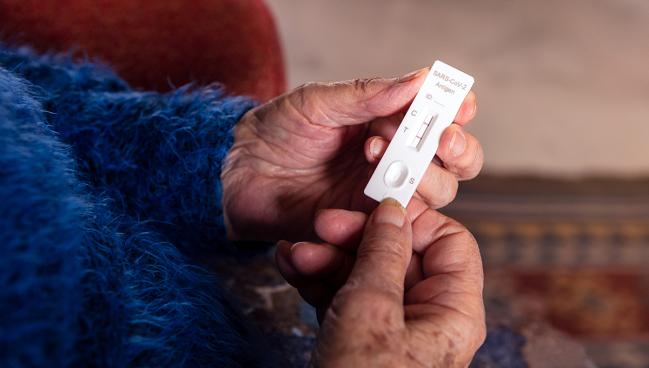COVID-19 Increases MACE Risk Nearly 3 Years Later: UK Biobank
Surviving a SARS-CoV-2 infection may be a reason to be more vigilant about general CV prevention measures moving forward.

Hospitalization for COVID-19 appears to convey a similar risk of a major adverse cardiac event over the next few years as having coronary artery disease, according to an analysis of data from the UK Biobank.
Covering the period of the pandemic before vaccines were widely available, the study found MACE risk through nearly 3 years of follow-up was slightly higher for patients without CVD who had been hospitalized for COVID-19 than for those with CVD and no prior COVID-19 admission, researchers led by James Hilser, MPH (University of Southern California, Los Angeles), report in a study published online this week in Arteriosclerosis, Thrombosis, and Vascular Biology.
The risk associated with COVID-19 was particularly high in patients with non-O blood types, which are found in about 60% of the global population.
Prior studies have identified an increased cardiovascular risk lasting 1 or 2 years after a bout of COVID-19, but “our data now shows, at least in the dataset we used, that that risk continues to be there out to 3 years after infection. So, it looks like it's long-term risk and, furthermore, it doesn't look like it's really attenuating,” Hooman Allayee, PhD (University of Southern California), one of the senior authors along with Stanley Hazen, MD, PhD (Cleveland Clinic, OH), told TCTMD.
The risk associated with severe COVID-19 appears to be similar to that conveyed by conditions like diabetes, peripheral artery disease, or CAD, which are treated with preventive medications like lipid-lowering drugs and aspirin, Allayee noted.
This “raises the question of whether we need to start treating people who got severe COVID prophylactically with the same medications,” he said. “We can't say that we're at that point yet, but it certainly raises that question and says that maybe doctors and patients should have a conversation.”
It looks like it's long-term risk and, furthermore, it doesn't look like it's really attenuating. Hooman Allayee
Sandeep Das, MD (UT Southwestern Medical Center, Dallas, TX), co-chair of the American Heart Association’s COVID-19 CVD Registry committee, agreed that definitive recommendations on preventive measures can’t be made based on this study because proof of causality is lacking.
But for now, a prior hospitalization for COVID-19 could be considered a risk marker, Das commented to TCTMD. “This may be something that pushes you to be a little bit more aggressive about trying to modify your long-term cardiovascular risk,” he said, pointing to standard measures like eating a healthy diet, exercising, controlling blood pressure and lipids, and quitting smoking.
Influence of Blood Type
For the current study, Hilser et al used the UK Biobank to identify 10,005 patients who had a documented case of COVID-19 between February and December 2020, based on either a positive PCR test for SARS-CoV-2 infection (n = 8,062) or a hospital-based ICD-19 code for COVID-19 (n = 1,943). They also identified 217,730 individuals without a record of COVID-19 to serve as controls. The study period was selected to remove COVID-19 vaccination as a potential confounder.
Over follow-up lasting about 2.75 years, risk of MACE (MI, stroke, or all-cause mortality) was higher in patients with COVID-19 of any severity than in the controls (HR 2.09; 95% CI 1.94-2.25), with an even greater risk observed among hospitalized cases (HR 3.85; 95% CI 3.51-4.24). The latter findings were similar in a propensity-matched analysis.
MACE risk was consistently higher after a bout of COVID-19 in the first, second, and third years of follow-up, even after accounting for other CVD risk factors.
Moreover, COVID-19 hospitalization could be considered a CAD risk equivalent, the researchers say, reporting that incident MACE risk was higher in patients without a history of CVD who were admitted for severe SARS-CoV-2 infection than for those with CVD who did not have COVID-19 (19.8% vs 17.9%; HR 1.21; 95% CI 1.08-1.37).
The investigators also examined whether genetics could influence the observed relationships, focusing on the ABO locus, which determines blood type and has been associated with susceptibility for MI and stroke, as well as SARS-CoV-2 infection. There was a significant interaction in which the risk of MI or stroke was higher after a COVID-19 hospitalization for patients with non-O blood types (6.3% vs 2.5%; HR 1.65; 95% CI 1.29-2.09) but not for those with blood type O (3.7% vs 2.5%; HR 0.96; 95% CI 0.66-1.39).
Speculating on Vaccine Impact
The study period ended before widespread rollout of COVID-19 vaccines in 2021, and Allayee pointed out that prior research, including a large UK study, has indicated that vaccination reduces the risk of MI and stroke.
“And so does that nullify our findings? I don't think so because even in the present day, people are still getting hospitalized for COVID,” he said. “I don't think that [vaccination is] going to make the problem go away. It might diminish the overall risk a little bit, but I think that the risk is still there based on data that you're seeing.”
The hope, Hilser told TCTMD, is that these data will serve as a jumping off point for patients to talk to their doctors, “where the physician now starts to look at the development of severe COVID . . . as a potential risk factor for these future cardiovascular events.”
What you can do is just be vigilant about doing the classic things to reduce your cardiovascular risk going forward. And don't panic. Sandeep Das
Allayee noted that professional societies have not yet updated their CV prevention guidelines to include COVID-19 as a risk factor. “And what we're suggesting is that maybe we should have this conversation,” he said, acknowledging that additional studies, possibly including randomized trials, are necessary.
There’s the potential for unscrupulous companies to try to use this information to drum up concern among consumers so they can sell “snake oil” treatments to reduce CV risk after a COVID-19 hospitalization, Das cautioned.
“I want people to stay grounded and stay focused on the basics that we know,” because nothing can be done to erase a past SARS-CoV-2 infection, he said. “Therefore, what you can do is just be vigilant about doing the classic things to reduce your cardiovascular risk going forward. And don't panic.”
Todd Neale is the Associate News Editor for TCTMD and a Senior Medical Journalist. He got his start in journalism at …
Read Full BioSources
Hilser JR, Spencer NJ, Afshari K, et al. COVID-19 is a coronary artery disease risk equivalent and exhibits a genetic interaction with ABO blood type. Arterioscler Thromb Vasc Biol. 2024;Epub ahead of print.
Disclosures
- The study was supported, in part, by grants from the National Institutes of Health.
- Hazen reports being named as co-inventor on pending and issued patents held by the Cleveland Clinic relating to cardiovascular diagnostics and therapeutics; having received royalty payments for inventions or discoveries related to cardiovascular diagnostics or therapeutics from Cleveland Heart Laboratory, a fully owned subsidiary of Quest Diagnostics, and Procter & Gamble; being a paid consultant for Zehna Therapeutics and Proctor & Gamble; and having received research funds from Zehna Therapeutics, Proctor & Gamble, Pfizer, and Roche Diagnostics.
- Hilser and Allayee report no relevant conflicts of interest.





Comments